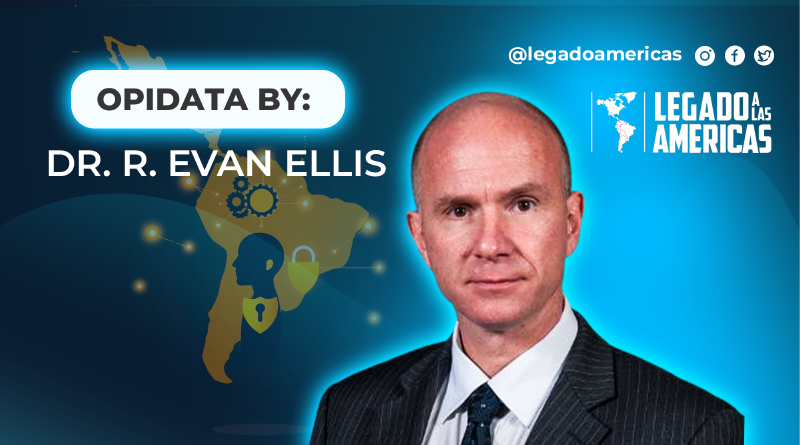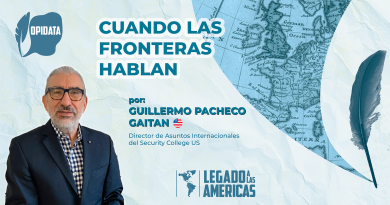Opidata #4: Re-Asserting the Value of the Individual for Latin America’s Security and Prosperity
Dr. R. Evan Ellis[1]
Empowerment of the individual, not the state, is the key to innovation, prosperity, physical and political security for Latin America, as the region engages with an unprecedented array of challenges and new partners.
Introduction
Legado a las Americas has honored me with an invitation to publish a monthly column in its forum Opidata. I recognize the breadth of knowledge, experience and public service represented by the group, and look forward to interacting with you through these writings.
During the three decades of my professional career, I have had the opportunity to work in academia, the private sector, and various U.S. government organizations. I make an effort to incorporate those multiple perspectives in my analysis, just as I seek to represent a respectful U.S. perspective to my Latin American colleagues, while also seeking to view global developments from the region’s perspective.
My writing and other work over the years has focused the region’s engagement with extra-hemispheric actors, particularly the People’s Republic of China (PRC), Russia, and Iran, as well as transnational organized crime and the political currents that have shaped the strategic dynamics of the region. Latin America and the Caribbean currently confront an unprecedented array of challenges, disillusionment with the performance of their governments, and important choices regarding political organization, policies on technology and other issues, and relationships with an array of global actors. In this, my introductory column, I would like to begin my conversation with you about these issues with you on a philosophical note, with a focus on one of the most important, yet neglected elements in the contemporary debate over solution and policies: the need to re-focus attention on the individual, their agency, empowerment and protection, rather than the State, as the solution to society’s ills.
An emphasis on the empowerment and protection of the individual (vis-à-vis the state) and the cost when that does not happen, is the most notably missing element in a struggle that is not going well.
During the Cold War, the struggle between the “democratic, free-market” West and the “communist” block, although never really so straightforward, highlighted the role of the individual, secure in their freedom, rights, and fruits of their labor, as the cornerstone of innovation and economic progress. The concept was espoused by iconic figures from Milton Freedman to Ayn Rand, to Ronald Regan. They recognized, each in different ways, that the State was a necessary evil, providing rule-of-law, security, and certain basic functions, yet inherently inefficient in spending the money of others, with a tendency to encroach on the individual, as those who controlled the State imposed rules and structures, in the name of the “public good,” on those under its dominion.
During the Cold War, the Soviet Union menacingly highlighted the oppressive tendency of unchecked State authority, whereas the US, with its iconic culture, innovation and prosperity, became the standard bearer (however oversimplistic) for the merits of individual liberty and agency.
Today, as the US engages with Latin America and the Caribbean over shared challenges such as security, development and democracy, is undercut by “illiberal” populist regimes, and “competes” with extra-hemispheric rivals such as the PRC, Russia and Iran, an emphasis on the empowerment and protection of the individual (vis-à-vis the state) and the cost when that does not happen, is the most notably missing element in a struggle that is not going well.
In the region, in the US, and in discussions about US policies toward the region, the emphasis is on “what kind” of additional government programs and spending are needed?” rather than “how can individuals be empowered to innovate, bring growth and solve problems through their agency?” especially if cutting the state is part of the solution to make that happen. Across Latin America and the Caribbean, residents are dissatisfied with the performance of their governments, yet the response across the region, from Mexico to Honduras, Nicaragua, Venezuela, Colombia, Chile, and Brazil, by vote or usurpation, has been governments expanding their programs and dominion over civil society.
Mavericks in the region, such as Argentina’s Libertarian President Javier Milei, receive little rhetorical support in courageous efforts to limit government, call-out the inherently corrupting nature of public spending, and recenter the discourse on the empowerment of the individual, from a United States that once championed these values.
Without a core centered on the value of individual agency, the US discourse over “democracy and human rights” predictably rings hollow–particularly to a region disillusioned with the performance of its elected governments, while by contrast, China’s “authoritarian” government appear to have brought impressive material growth, security and order. Yet part of the problem is that the contemporary US focus on procedures and outcomes, including elections and the protection of disadvantaged groups, has lost the spirit of the Cold War discourse, which highlighted the importance of individuals as economic actors, with their property and actions protected by an egalitarian framework of law, empowering them to reap the reward of their initiative and risk.
De-anchored from arguments about individual initiative in market-based economies as the root of prosperity, the discourse about the region’s relationship with China has become dominated by debates over “who will give more” In these, the region is a passive recipient of courtship, and in which the US, with its semi-free market economy, is at a disadvantage. Without the framework of individuals responsible for producing value through their choices, the region’s politicians defend their “right” to enter into contractual relationships with PRC-based companies based on the absence of a US “counter-offer” without reference to whether the Chinese proposal make business sense, are likely to be poorly executed, or produce unacceptable social and environmental consequences.
Re-centering the discourse with and in Latin America around the individual has multiple dimensions:
In economic affairs, it involves focusing on how to create an attractive investment environment by reducing government regulation and taxes and fighting corruption and insecurity, so that entrepreneurs and other employers can flourish, protected and regulated by efficient, effective, and objective institutions. Doing so will also ensure that PRC participation is limited to projects that make economic sense, won through competition on a level playing field, and are properly evaluated and supervised. It will thus also reduce opportunities for non-transparent “state to state” deals where the “win-win” involves personal benefits for the Chinese companies and the government officials in the region signing the contract. In discussions of political models, the role of the state in the economy, and the balance between capability and individual protections in new technologies, focusing on the individual will move the away from the losing debate about whether “democracy” is better at establishing order and delivering “the goods,” to highlight the risks when authoritarian regimes can impose their will without adversely effected groups having checks and balances through independent institutions, media, or economic bases of power, to appeal.
Conclusion
Re-centering the discourse with Latin America on the individual will not solve the region’s problems, nor “keep China out” of Latin America. It will, however, lead to a broader and more promising public policy discussion than debates between alternatively flawed, state-oriented solutions. It will move the China discussion away from “who offers more money” to “how does the region best leverage all of the opportunities it faces, while controlling the risks.” In short, it will give the region agency, hope, and the basis for a healthier partnership with the US.
[1] The author is Latin America Research Professor with the U.S. Army War College. The views expressed herein are strictly his own.




